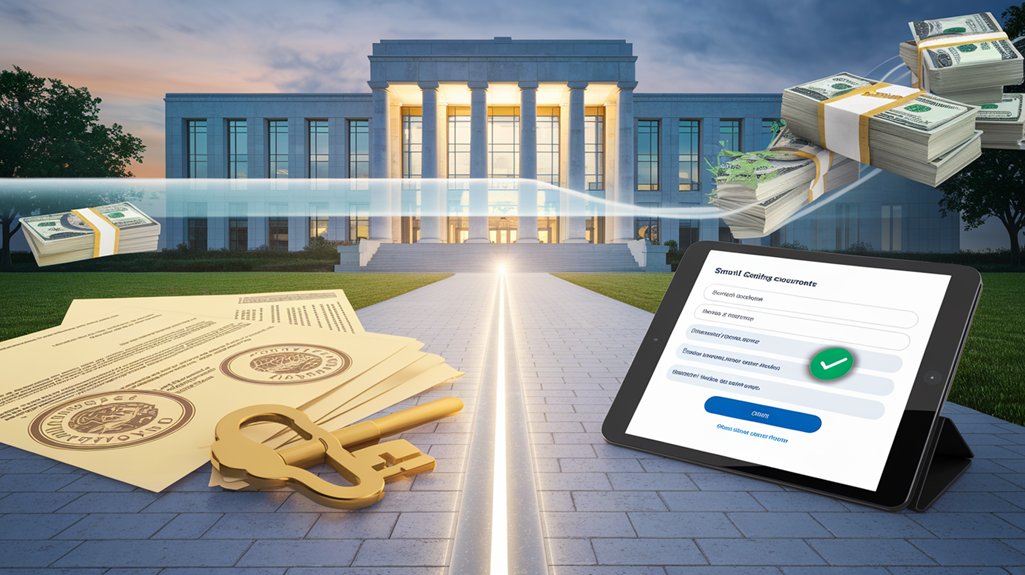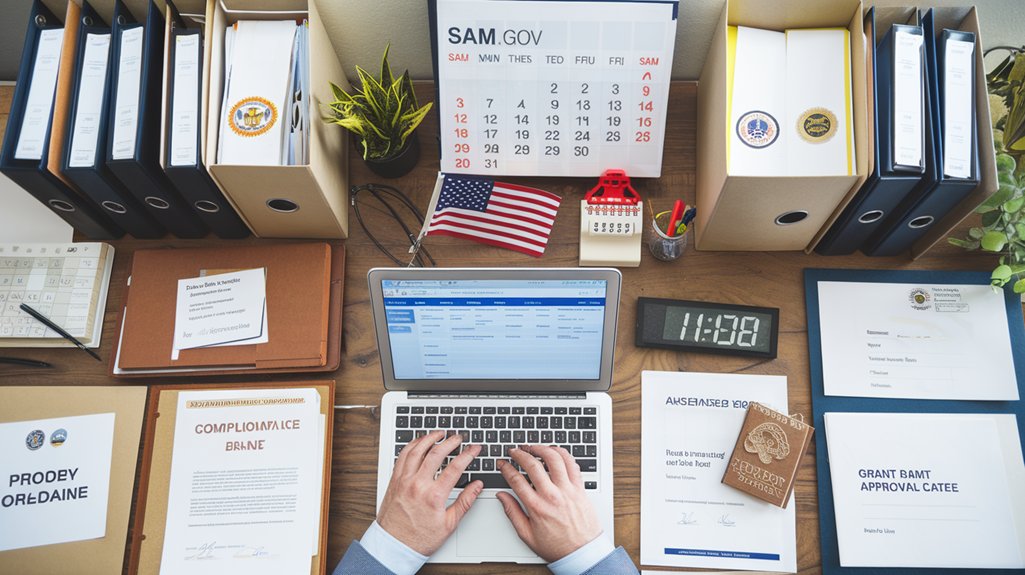SAM registration is mandatory for nonprofits seeking federal grants. The process creates a Unique Entity Identifier (UEI) that validates organizations with funding agencies. Without active registration, nonprofits become invisible to federal grantmakers. Requirements include accurate legal information, physical address, TIN, and banking details. Registration typically takes 7-10 business days and requires annual renewal. Organizations should begin the renewal process at least 60 days before expiration to maintain continuous funding eligibility. Further information reveals essential strategies for maintaining compliant status.
The Essential Connection Between SAM Registration and Nonprofit Grant Eligibility

When nonprofit organizations pursue federal funding opportunities, SAM registration serves as the mandatory first step in the grant acquisition process. This critical requirement creates a Unique Entity Identifier (UEI) that federal agencies use to validate eligibility for grant programs.
Despite potential registration challenges, the SAM benefits include centralized verification and increased visibility to funding agencies. Maintaining an active registration enhances nonprofit credibility with potential funders and grantmaking organizations.
The system requires nonprofits to provide accurate organizational information, including legal name, physical address, TIN, and banking details. Entities seeking federal grants must maintain compliance with federal procurement standards throughout the renewal process. Without active SAM registration, organizations immediately become invisible to federal grant-making agencies, regardless of their qualifications.
Organizations must renew registration annually to maintain eligibility, as lapses result in immediate disqualification from funding opportunities. Federal agencies can verify nonprofit status in real-time through SAM.gov’s directory system. The registration process typically takes 7-10 business days for most funding opportunities, making advance planning essential for nonprofits seeking grants.
Streamlining Your Nonprofit’s SAM Registration Process for Maximum Funding Opportunities

Although many nonprofits find the System for Award Management (SAM) registration process intimidating, implementing a streamlined approach greatly increases access to federal funding opportunities.
Organizations with active registrations gain considerable SAM registration benefits, including enhanced nonprofit visibility in federal databases and increased credibility with potential grantors.
To streamline registration, nonprofits should:
- Gather all required documentation before starting
- Complete the official process through SAM.gov only
- Verify accuracy in all fields
- Assign specific user roles for ongoing management
Maintaining a valid SAM profile is essential for accessing thousands of federal grant opportunities annually.
Common pitfalls to avoid include missing annual renewal deadlines, entering inaccurate information, and neglecting to monitor SAM communications.
Leveraging available resources such as official SAM.gov guides or third-party registrars can greatly simplify the process and help maintain compliance. The completely free registration allows nonprofits to allocate their limited resources to other critical operational areas.
Critical SAM Renewal Strategies to Maintain Continuous Access to Federal Grants

Maintaining an active System for Award Management (SAM) registration stands as the cornerstone for nonprofits seeking consistent access to federal funding opportunities. Organizations must prioritize renewal timelines, initiating the process at least 60 days before expiration to prevent disruptions in funding eligibility.
Federal agency verification ensures recipients meet all compliance standards before grant disbursement. Effective compliance maintenance requires systematic verification of essential elements: the organization’s legal name, current UEI, TIN verification with the IRS, and updated CAGE or NCAGE codes.
Nonprofits should implement a robust renewal strategy that includes:
- Regular calendar reminders for renewal deadlines
- Quarterly review of registration information
- Maintaining thorough documentation records
- Training staff on renewal procedures
- Addressing potential verification issues proactively
Early submission helps organizations navigate potential system backlogs while preserving continuous access to critical federal grant opportunities. Remember that renewal can take up to 10 business days to complete, making early action essential for uninterrupted funding eligibility.
Frequently Asked Questions
How Long Does the SAM Verification Process Typically Take?
The SAM verification timeline typically ranges from 6 to 8 weeks for completion.
Recent processing delays have extended this timeframe to 10 weeks or more for some organizations.
After submitting identification documents like EIN or TIN, approval can take up to 14 days.
Factors affecting this schedule include business complexity, information accuracy, and current registration volume.
Organizations should plan accordingly by starting early and ensuring all documentation is properly prepared and accurate.
Can Fiscal Sponsors Apply for Grants Without Their Own Registration?
Fiscal sponsors cannot apply for grants without their own registration.
Organizations serving as fiscal sponsors must maintain proper registration status to fulfill their role in supporting unregistered projects.
The fiscal sponsorship model depends on the sponsor having established grant eligibility through appropriate registrations and 501(c)(3) status.
Projects seeking funding through fiscal sponsorship rely on their sponsor’s existing registrations to access grant opportunities, making the sponsor’s registration compliance essential for the relationship to function effectively.
Are State and Local Government Grants Also Requiring SAM Registration?
State grants and local grants typically do not require SAM registration if they use only state or local funding sources.
However, if these grants involve any federal pass-through funds, SAM registration is mandatory.
Many state and local governments have adopted their own registration systems for non-federal grants.
Organizations should check with the specific granting agency to determine registration requirements before applying for state or local government funding opportunities.
What Common Errors Cause SAM Registration Applications to Be Rejected?
Several application mistakes frequently lead to SAM registration rejections. These include leaving required fields blank, submitting unsigned or incorrect documentation, and misunderstanding eligibility requirements.
Other common issues involve using incorrect UEI numbers, choosing inaccurate NAICS codes, and failing to navigate the system properly.
Meeting all registration requirements demands careful attention to detail, proper document preparation, and accurate business information that matches official records.
Can International Nonprofits Qualify for SAM Registration and Federal Grants?
Yes, international nonprofits can qualify for SAM registration and federal grants.
These organizations must meet specific international eligibility requirements, including obtaining a Unique Entity ID, NCAGE Code, and EIN/TIN.
All documentation must match exactly across systems, with physical addresses rather than P.O. boxes. A notarized letter confirming registration authority is required.
Once registered, international entities can access grant opportunities through Grants.gov, though they must comply with federal regulations and maintain updated SAM profiles.